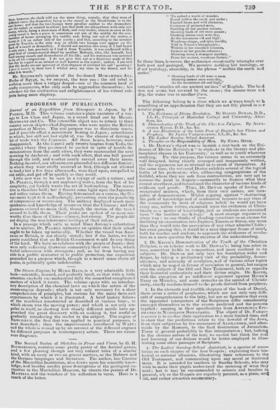PROGRESS OF PUBLICATION.
Journal of an Expedition from Sincapore to Japan, by P. PARKER, M.D. This volume contains a plain narrative of a voy- age to Loo Choo and Japan, in a vessel fitted out by Messrs. OLYPHANT and Cu. The ostensible object was to return to their country seven shipwrecked Japanese, who were under the British protection at Macao. The real purpose was to distribute tracts, and if possible effect a missionary footing in Japan ; subordinate to which, but still not lost sight of, was the chance of driving a bit of trade with the Japanese. All these hopes, however, were disappointed. At Out fr-gaw a only twenty leagues from Yedo, the capital,) where they presumed to anchor in spite of hostile de- monstrations from the auth,rities, they were cannonaded the next morning by daybreak ; and with such effect, that one ball passed through the hull, and another nearly carried away their masts. Nothing daunted, our adventurers proceeded to a different district ; in which they were civilly received at first, (though not allowed to land,) but a few days afterwards, were fired upon, compelled to -cut cable, and get off as quickly as they could.
Little new was to be seen in a voyage of such a nature; and Dr. PARKER, though a not unpleasieg writer, from the fact of his simplicity, yet luckily wants the art of bookmaking. The narra- tive is therefore bold; but it throws some light upon theJapanese, and rather raises them. Having determined on a course, the Go- verment kept to it unflinchingly, preventing even the possibility of compromise or concession. The military displayed much more -quickness and knowledge of resources than the Chinese ; and the gunners evinced no mean skill, though the motion of the vessi seemed to baffle them. Their junks are spoken of as more sea- worthy than those of China—clumsy, but strong. The people did not display the non-intercourse feelings of their rulers.
In a passage which calls to mind Marc Antony's exhortation not to mutiny, Dr. PALKER intimates an opinion that their rebuff • ought to be taken up nationally. Whether the vessel was Ame- rican or British, is not clearly stated ; but if the latter, we feel pretty confident that no British Government would do any thing of the kind. We have no relations with the people of Japan ; they were only enforcing (however summarily) their own laws, which forbid intercourse with strangers; and, so far from having any title to a public character or to public protection, the expedition proceeded for a purpose which, though in a moral sense above all praise, is politically quite indefensible.


























 Previous page
Previous page